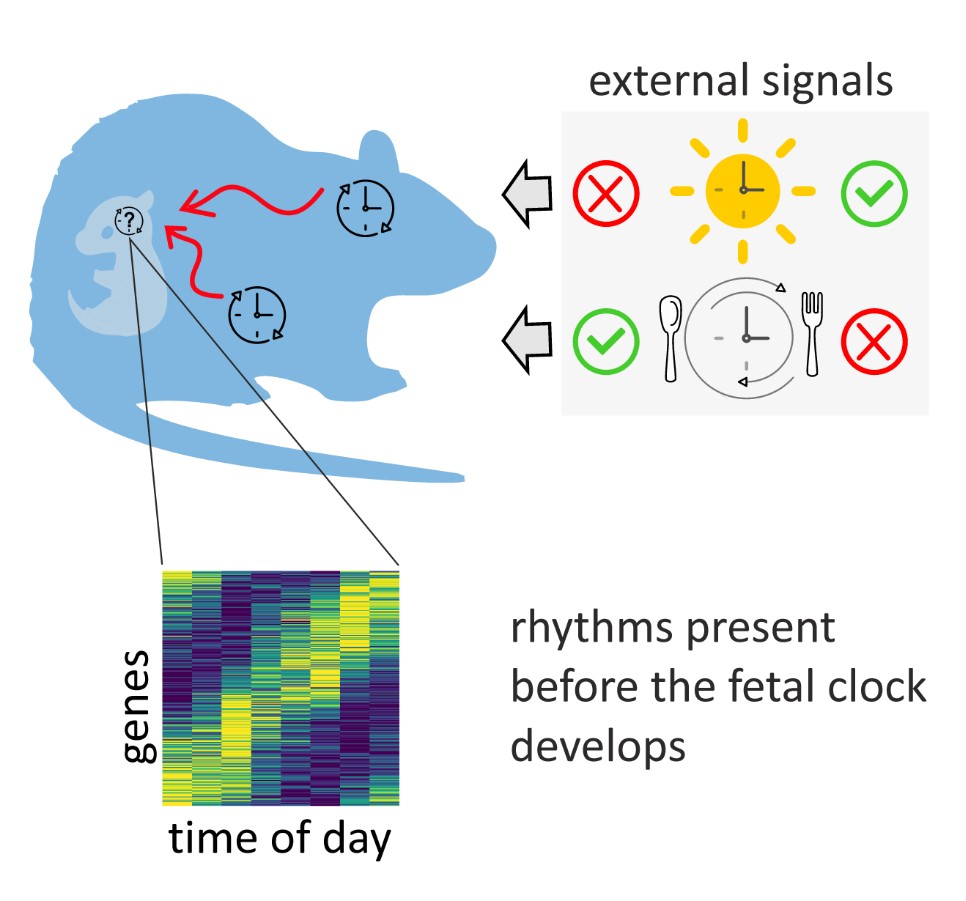
The mother's daily rhythm supports the development of the fetal biological clock
30. 06. 2022
Before the internal biological clock of the fetus starts ticking on its own, the mother's rhythmic behaviour influences the function and development of this structure. This was discovered and published in a new study in the PLOS Biology journal by a team led by Alena Sumová from the Institute of Physiology of the CAS. The discovery significantly contributes to the understanding of the development of the internal clock and may find application in the treatment of premature babies.
Just like we adjust our wristwatches, the biological clock in our brains adjusts according to daylight and then passes this information on to the clocks in our body cells.
"This whole system allows us to optimise the processes in our body in response to the changing conditions during the day and night. It allows us to adjust processes to the right time of day, for example, to prepare our digestion for the time of day when we usually consume food, or to prepare us for sleep. Or even before we wake up in the morning, it already starts processes that allow us to be active right after we wake up," explains Alena Sumová from the Institute of Physiology of the CAS.
When the clock's function is disrupted, the risk of developing certain diseases can increase. The central clock in our body is located in the suprachiasmatic nuclei of the hypothalamus (SCN) and is driven by the rhythmic switching on and off of the clock genes. However, this autonomous rhythmic gene activity in the SCN begins relatively late in the fetal development, raising the question of whether maternal signals, i.e., the mother's biological clock, may influence the gene activity in the SCN before it develops.
The development of the unborn child's clock is influenced by the mother's clock and daily rhythm
To further examine this question, the authors compared the daily pattern of gene activity in the SCN in developing fetuses of pregnant female rats that were kept in the dark under two different conditions. The control group of female rats had a functional clock in the SCN and free access to food, while the other group had the clock removed and access to food restricted. Consequently, their food intake showed a daily rhythm even in the absence of the central clock.
"We found out that maternal signals are indeed involved in the regulation of a large number of genes in the fetal brain," describes Alena Sumová.
The researchers obtained a considerable amount of data on the activity of a large group of genes and were therefore able to use advanced biostatistical methods to sort them into those that switched on and off rhythmically during the 24 hours and those that functioned arrhythmically. They further categorised the rhythmic genes according to their function, the way they were involved in cellular processes, and which maternal signals regulated them.
"A surprising and important finding was that genes controlled by maternal signals are involved both in processes related to neuronal development and processes related to signaling between neurons in the fetal SCN. This means that maternal signals significantly influence the development of this structure in the fetal brain. Even more surprising was the finding that in the absence of the mother's clock, her regular daily food intake can largely take its place, which can also provide an important signal to the fetal clock," Sumová highlights.
Preventing delayed child development and caring for premature babies
The unexpected range and specificity of the SCN cells' response to maternal signals highlights the importance of a functioning maternal biological clock during pregnancy and points to the potential impact of the absence of such signals in pre-term babies.
"I can see the application of our results on two levels – the first is the possibility of almost immediate use in clinical practice wherever pregnant individuals and breastfeeding mothers are cared for, because the results clearly show the enormous importance of a properly adjusted biological clock and the mother's regular daily routine for the development of the child's brain," Sumová notes.
She recommends maintaining a distinct daily rhythm according to the time of day, more daylight during the day and less artificial light at night, and regular food intake.
"Nowadays, it is not so easy, because modern society steers us to leading a lifestyle that disrupts the daily rhythms – we are influenced by artificial light, many pregnant people even work in shifts, etc., which is a significant factor that disrupts the biological clock."
On a second, longer-term level, the results may contribute to the healthcare of premature babies.
"Modern medicine now allows premature babies to survive at an increasingly early developmental stage. These babies are placed in incubators where they are deprived of all maternal signals, including the rhythmic ones," Sumová explains.
"The absence of rhythmic signals is very likely related to delayed brain development, which is also suggested by our results. I believe that continued research could introduce new technologies in the future to improve conditions in incubators to more closely simulate the natural maternal environment, avoid negative impacts and improve the health of premature babies."
The study in question pioneers the identification of fetal SCN responses to different maternal rhythmic signals, using transcriptomic and proteomic analyses at a stage when the fetal clock has not yet developed.

Read also
- A unique method of rare-earth recycling can strengthen the material independence
- High-energy cosmic rays dominated by heavy METALS
- Genome Tool Developed at CAS Featured in PLoS Genetics
- Why do brain cancer cells steal mitochondria?
- Secrets of the Nano- World: a new comic book about nanotechnology
- Teen duo from Slovakia and Czechia named Global Winner for clean water solution
- Professor Pavel Hozák Receives the Paul Nakane Prize
- Neutrino is lighter than previously thought
- The Earth Prize 2025 goes to Czechia and Slovakia for pioneering water purifier
- Scientists discover compound that “should not exist”
Contacts for Media
Markéta Růžičková
Public Relations Manager
+420 777 970 812
Eliška Zvolánková
+420 739 535 007
Martina Spěváčková
+420 733 697 112